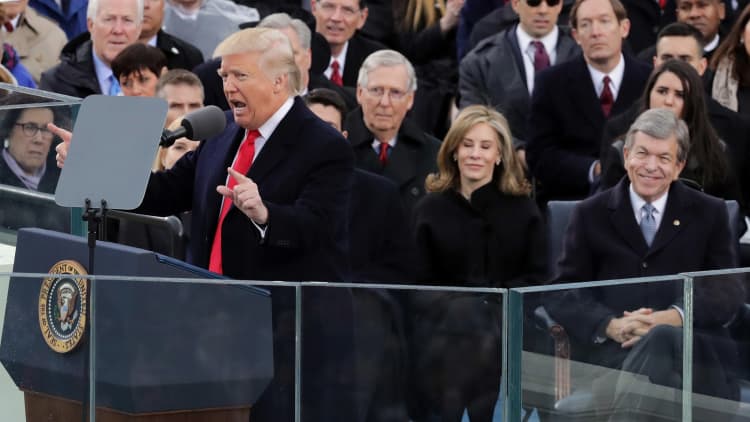
Newly inaugurated President Donald J. Trump took office on Friday with a dark, populist message that surprised investors and left conservatives unsure exactly what they would get from the new White House.
Trump, in a brief inaugural address that spoke of rampant "American carnage," said both that he would send government back from Washington to the people and that the government would now take on a more muscular role in dictating the terms of trade while rebuilding crumbling infrastructure.
The gloomy address, in which Trump portrayed a broken America littered with shuttered factories and rampant crime, left investors puzzled. The Dow rose around 100 points before Trump's speech but initially gave up half those gains after the speech.
Some analysts said they expected a more hopeful and unifying message from Trump, especially as he takes office with some of the lowest approval ratings of any president in modern American history.
Instead, Trump spoke much as he had on the campaign trail, delivering a message that helped propel him to surprising wins in Pennsylvania, Michigan and Wisconsin. Those victories helped drive him to 306 electoral votes and the White House in November despite losing the popular vote by nearly 3 million.
"We must protect our borders from the ravages of other countries making our product, stealing our companies and destroying our jobs," Trump said. "Protection will lead to great prosperity and strength."
And the America he described was not one of 4.7 percent unemployment and rising wages — as official statistics show — but one on the verge of collapse. "Mothers and children trapped in poverty in our inner cities, rusted out factories, scattered like tombstones across the across the landscape of our nation," Trump said in laying out his vision of hellscape America. "This American carnage stops right here and stops right now."
Some conservatives who did not back Trump during the campaign are now left trying to square his pledge of stripping power from Washington while also setting up the federal government as a major arbiter of the economy.
"Trump: 1. Power from DC to you. 2. Government will build everything, interfere in trade, guarantee you a job. These cannot both be true," tweeted conservative commentator Ben Shapiro.
Market analysts were left somewhat stunned by the address, which seemed to be a missed opportunity for Trump to broaden his appeal to the tens of millions of American who remain deeply unnerved by his ascension to the presidency.
"Overall that was a more protectionist and nationalist speech than I expected," Megan Greene, chief economist at Manulife Asset Management, told me on Friday. "Rather than unifying the country after one of the most divisive elections in U.S. history, he highlighted how bad things are in the U.S. economy and engaged in scaremongering, which was consistent with his campaign."
Other analysts noted that the speech did not exactly clarify for investors what Trump's legislative priorities would look like. "Typically you think of inaugural addresses as uplifting, big-picture speeches," Jack Ablin of BMO Private Bank told me.
"Investors came into it worried about specific mentions of America first and confrontational rhetoric and that's exactly what they saw. It was confrontational both domestically and internationally. And there were not a whole lot of specifics that investors could sink their teeth into."
Overall, the speech suggested that Trump does not believe he needs to change anything to improve his dismal standing with the public. According to the Real Clear Politics average, Trump has a 41.8 percent favorable rating to 49.9 percent negative. Trump himself has rejected these numbers as phony, equating them with pre-election pulls suggesting he would lose to Hillary Clinton.
But these are national polls. And the national polls were mostly correct in predicting Clinton would carry the national vote by a couple of percentage points.
So there is no reason to think Trump is actually more popular than these polls show. And the favorability ratings will matter as Trump begins the business of governing. He has already clashed with Republicans on Capitol Hill over plans to repeal Obamacare and the structure of corporate tax cuts. If congressional Republicans believe Trump to be a widely unpopular president they will feel more emboldened to press their own agenda over his.
Trump will also have a tougher time selling his unilateral plans to change immigration and trade policy if his personal ratings remain low. Trump had an opportunity to start his administration on a positive, uplifting note. He chose not to take it.
—Ben White is Politico's chief economic correspondent and a CNBC contributor. He also authors the daily tip sheet Politico Morning Money [politico.com/morningmoney]. Follow him on Twitter @morningmoneyben.


